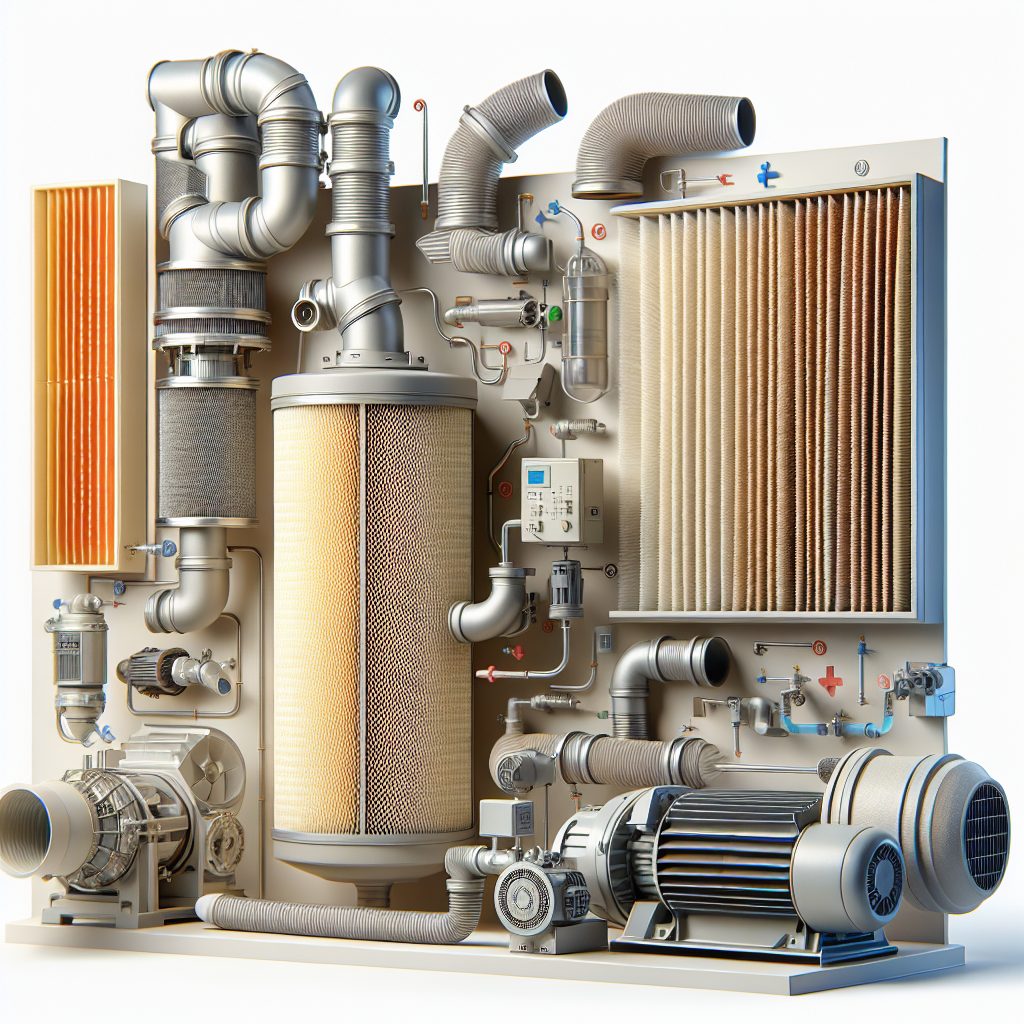
Air filtration systems are an important part of creating healthy indoor air quality. They are designed to trap and remove airborne particles from the environment as well as reduce the concentration of certain gases (e.g., carbon monoxide, dust, pollen, etc.). Air filtration systems come in several different forms, such as mechanical air purifiers, high-efficiency filtration systems, and electrostatic air cleaning systems. In addition to their primary functions, these systems can also trap and reduce strong odors, VOCs (volatile organic compounds) and harmful bacteria from the air. Not only do these systems create a safer and cleaner environment, but they are also energy efficient, reducing the amount of energy used to heat and cool indoor air.
The key takeaways of this article are twofold: first, that air filtration systems play an important role in improving indoor air quality, and second, that they help reduce energy consumption due to their energy efficiency. In the next section of this article, we’ll take a closer look at the various types of air filtration systems and how they work. We’ll also look at the benefits of using air filtration systems and the steps you can take to ensure you get the most out of your air filtration system.
Key Takeaways
1. Air filtration systems are specialized devices designed to remove contaminants from the air in a home or building.
2. Different types of air filtration systems are available, each containing unique technologies that remove different types of air contaminants.
3. Air filtration systems are beneficial for people with allergies or asthma, as well as anyone who wants clean air in their home.
4. It is important to choose the appropriate size, design, and type of filtration system according to the needs of the home or building.
5. A variety of filters, replacements, and accessories are available to help maintain and increase the efficiency of an air filtration system.
What are Air Filtration Systems?
Air filtration systems are designed to capture and remove airborne particles from the air, such as dust, pollen, and other pollutants. They are typically installed in homes and businesses to improve air quality and to reduce the risk of airborne bacteria, mold, and viruses.
How do Air Filtration Systems Work?
Air filtration systems use a variety of technologies to capture and remove airborne particles from the air. The most common type of air filtration system is the HEPA filter, which stands for High Efficiency Particulate Arrestance. This type of filter captures particles in its fibers and traps them, preventing them from entering the air. There are also Ultra-Low Particulate Air (ULPA) filters, which are more effective than the HEPA filter, and Carbon Filtration systems, which use activated carbon to capture and absorb pollutants.
Benefits of Air Filtration Systems
The primary benefit of air filtration systems is improved air quality. Because these systems capture and remove airborne particles from the air, they reduce the risk of exposure to bacteria, mold, and other airborne pollutants. Air filtration systems can also help reduce allergens and irritants from entering the air, reducing the risk of asthma and other respiratory illnesses.
Types of Air Filtration Systems
Air filtration systems come in a variety of sizes and types, so it’s important to choose a system that best fits your needs. Some systems are placed in the home or business and are designed to filter the air in the room. Other systems, known as whole-house air filtration systems, are designed to filter the air throughout the entire building. The size and type of system you choose should be based on the size of the space you need to filter and the kind of particles you need to remove.
Maintaining Air Filtration Systems
Air filtration systems should be inspected and maintained regularly to ensure that they are functioning properly. Filters should be changed or cleaned on a regular basis in order to maintain the efficiency of the system. In addition, air ducts should be regularly cleaned to ensure that they are free of dust and debris that could clog the system.
Guides and Tips for Choosing Air Filtration Systems?
1. Identify the size of the space that needs air filtration.
2. Consider if the particles that need to be removed can be captured with a basic HEPA filter or if a more advanced system is needed.
3. Look for air filtration systems that are designed to meet your specific needs.
4. Regularly inspect and maintain air filtration systems to ensure they are functioning properly.
5. Clean air ducts and replace filters regularly to maintain system efficiency.
What are air filtration systems?
Air filtration systems are devices designed to remove particles from the air. They are used in many indoor and outdoor settings, such as homes and buildings, to improve air quality and reduce the presence of pollutants. Common air filtration systems include air purifiers, electrostatic precipitators, and mechanical filters.
How do air filtration systems work?
Air filtration systems work by drawing air through a filter or other method of purification. The filter captures particles, including dust, pollen, smoke, and other pollutants, and the purified air is then blown out into the room. Different air filtration systems use different methods of filtration, such as a basic filter or a combination of filters.
What are the benefits of using air filtration systems?
The main benefit of using an air filtration system is improved air quality. By removing particles from the air, air filtration systems can reduce allergies and other respiratory illnesses. They can also help reduce the presence of pollutants that can aggravate asthma and other chronic conditions. And, because air filtration systems draw air through the filter, they can reduce the presence of odors and improve the overall air quality in the home or office.
How often should air filtration systems be changed?
The frequency of filter changes for air filtration systems depends on the type of system being used. Many systems come with an indicator that shows when it’s time to change the filters. Generally, filters should be changed at least once every three months. More frequent changes may be necessary if the system is used in a particularly dusty area or if large amounts of pollutants are present in the air.
Does an air filtration system help with pet odors?
Yes, air filtration systems can help with pet odors as they can reduce the presence of pet dander, pollen, and other allergens in the air. Filtering the air can also reduce pet odors as many air filtration systems are designed to absorb odors from the air. In addition, using an air freshener or an ionizer in conjunction with an air filtration system can help to reduce pet odors.
Are there any health risks associated with air filtration systems?
In general, air filtration systems are considered to be very safe to use. However, some people may experience respiratory irritation, particularly if a strong filter is used, so it’s always best to consult a doctor before using a filtration system. In general, air filtration systems should be used according to the manufacturer’s instructions to avoid any potential health risks.
How efficient are air filtration systems?
Air filtration systems are typically very efficient, with many capturing up to 99.9% of all pollutants in the air. The efficiency of a system depends on the type of filter being used, as well as the level of pollutants present in the air. Air filtration systems can help reduce the presence of particles in the air, but they are not 100% effective, so other methods may be needed to reduce the presence of pollutants.
Do air filtration systems use electricity?
Yes, most air filtration systems require electricity to operate. Some are designed to be plugged into a wall outlet, while others require a separate power source, such as a generator or battery. It’s important to check the manufacturer’s instructions before using an air filtration system to make sure that the system is set up correctly and that it has enough electricity to operate properly.
How noisy are air filtration systems?
The noise level of an air filtration system depends on the model. Generally, air filtration systems are designed to be as quiet as possible, but some may produce a slight hum or other noise. Many air filtration systems come with noise-reducing features, such as a filter that absorbs sounds or an exterior case designed to dampen noise.
What are the costs associated with air filtration systems?
The cost of an air filtration system depends on the type and size of the system. Basic air filtration systems can range from a few hundred dollars to several thousand dollars, depending on the features. In addition, the cost of filters will vary depending on the size and type of system being used. Replacement filters must be purchased as needed, and they can range from a few dollars up to several hundred depending on the type.
Final Thought
Air filtration systems can be a great way to improve air quality and reduce the presence of allergens and pollutants in indoor spaces. They are typically very efficient, and their costs can range from affordable to expensive, depending on the features and size of the system. Air filtration systems are also easy to use and maintain, and they require minimal upkeep to be effective. Ultimately, air filtration systems are a great solution for improving indoor air quality.
When considering an air filtration system, it’s important to make sure that the system is the right size for your space and that it has the features that you need. It’s also important to compare different models to find the one that best fits your needs and budget. With a little research and consideration, you can find the perfect air filtration system for your needs.



